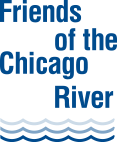A Passion for Wildlife Photography inspires Data-Driven Sustainability Work
 Friends' Amy Heldman (center) at the Sustainability Research and Innovation Congress in downtown Chicago.
Friends' Amy Heldman (center) at the Sustainability Research and Innovation Congress in downtown Chicago.
In June, Amy Heldman, Friends of the Chicago River’s senior planner and GIS manager, took the stage at the Sustainability Research and Innovation Congress in downtown Chicago, where she shared how her love of wildlife photography inspires and informs her professional work at Friends. Speaking at the Congress’s Sustainability Storytelling Night, Amy was one of eight storytellers invited to share personal and transformational sustainability journeys. They came from around the world. The SRI Congress series is co-convened by the Belmont Forum, an international funding platform addressing the world’s most pressing environmental change issues, and Future Earth, a global constellation of researchers and practitioners supporting informed transformations to sustainability.
Amy shared how her personal passion for wildlife photography connects and inspires her work overseeing the Greater Chicago Watershed Alliance’s award-winning Natural Solutions Tool. Amy’s leadership in the training and implementation the Tool helps her see the multitude of ways people are using the Tool’s data, whether it’s through storytelling, youth education, project implementation, or advocacy. She highlighted that data alone does not equal change, data is as important as your ability to effectively communicate it, put it into action, and build partnerships. The free and publicly accessible Tool has helped numerous groups champion their own environmental, public health, equity, and connectivity stories.
The Congress, hosted for the first time in the United States by the University of Illinois System, is a global gathering of sustainability leaders focused on four core pathways: One Health, collaborative decision-making, holistic solutions, and innovative tools.
The Tool covers all or parts of four Northeastern Illinois counties: Cook, Lake, DuPage, and Will (predominantly Cook and Lake). Friends and the Trust for Public Land are currently expanding the Tool into all of Lake County. This expansion will allow the Tool to reach environmental justice communities in Lake County such as Zion, North Chicago, and Waukegan, that could benefit from this resource to drive their own unique geographic stories and impact.

